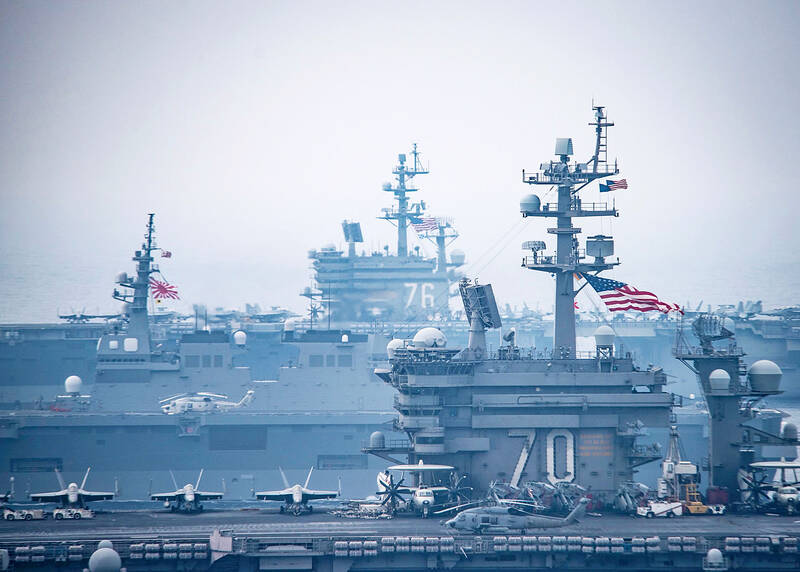Washington should support Taipei’s international participation and include Taiwan in combat-readiness operations to thwart China’s ambitions in the Indo-Pacific region, former US deputy undersecretary of the navy Seth Cropsey said.
Taiwan’s status “was not the root of Sino-American antagonism, but it was the clearest expression of it,” Cropsey, who is also the founder and president of US think tank Yorktown Institute, wrote in an opinion piece published on Monday on the Web site of US daily The Hill.
The tension over Taiwan between the US and China is a strategic antagonism, rather than a legal one, founded on “mutually conflicting long-term political, military and economic objectives,” he said.

Photo: AFP / US Navy / Mass Communication Specialist 2nd Class Z.A. Landers
The disputes between the US and China are broadly “based on the Chinese Communist Party’s Asian and Eurasian ambitions,” he said, adding that Taiwan’s role in the US defense system makes it the strategic center of the rivalry.
Taiwan “remains key to China’s self-image,” which also includes a more aggressive military posture, Cropsey said.
To keep Beijing from taking military action against Taiwan “requires deterring Chinese aggression throughout the Indo-Pacific” region, as Taipei is “a mere stepping-stone” to China’s ambition of regional dominance, he said.
Beijing taking control of Taiwan would jeopardize the defenses of Japan, the Philippines and Australia, he added.
China could control the eastern part of Eurasia’s most important trade route by taking the Malacca and Lombok straits, he said.
China is aware of the situation and has “thought well past the first contingencies,” he added.
Cropsey called on the US to prioritize the military aspects of deterrence by allocating more to the defense budget so that it “can sustain the forces needed to fight a large-scale Indo-Pacific air-naval war.”
More importantly, the US should “integrate the capabilities of regional allies, allowing them to operate jointly with US forces in combat,” which “must include Taiwan as well, considering Taipei’s geographic and military relevance,” he said.
Providing Taiwan with more diplomatic outlets through participation in international organizations and connections with other countries would also help the US’ efforts and should be encouraged, he said.
Legal disputes over Taiwan’s status are symptoms of underlying antagonisms between the US and China, he said.
Renewing discussions on the issue would have no real impact on the relationship between Washington and Beijing, he said.
The US providing China with public or private assurances against a declaration of Taiwanese independence would not meaningfully decrease the odds of confrontation, he said.
Taiwan is “an independent country under any definition,” a status “in no need of modification,” and which makes it “meaningless to say so in one manner or another,” he said.
“China has already lost Taiwan, insofar as Taiwan is not ruled by the mainland,” he said, adding that Taiwan only refrains from declaring independence to avoid provoking China.
“The time for language games has passed,” he said.

DAREDEVIL: Honnold said it had always been a dream of his to climb Taipei 101, while a Netflix producer said the skyscraper was ‘a real icon of this country’ US climber Alex Honnold yesterday took on Taiwan’s tallest building, becoming the first person to scale Taipei 101 without a rope, harness or safety net. Hundreds of spectators gathered at the base of the 101-story skyscraper to watch Honnold, 40, embark on his daredevil feat, which was also broadcast live on Netflix. Dressed in a red T-shirt and yellow custom-made climbing shoes, Honnold swiftly moved up the southeast face of the glass and steel building. At one point, he stepped onto a platform midway up to wave down at fans and onlookers who were taking photos. People watching from inside

A Vietnamese migrant worker yesterday won NT$12 million (US$379,627) on a Lunar New Year scratch card in Kaohsiung as part of Taiwan Lottery Co’s (台灣彩券) “NT$12 Million Grand Fortune” (1200萬大吉利) game. The man was the first top-prize winner of the new game launched on Jan. 6 to mark the Lunar New Year. Three Vietnamese migrant workers visited a Taiwan Lottery shop on Xinyue Street in Kaohsiung’s Gangshan District (崗山), a store representative said. The player bought multiple tickets and, after winning nothing, held the final lottery ticket in one hand and rubbed the store’s statue of the Maitreya Buddha’s belly with the other,

‘COMMITTED TO DETERRENCE’: Washington would stand by its allies, but it can only help as much as countries help themselves, Raymond Greene said The US is committed to deterrence in the first island chain, but it should not bear the burden alone, as “freedom is not free,” American Institute in Taiwan Director Raymond Greene said in a speech at the Institute for National Defense and Security Research’s “Strengthening Resilience: Defense as the Engine of Development” seminar in Taipei yesterday. In the speech, titled “Investing Together and a Secure and Prosperous Future,” Greene highlighted the contributions of US President Donald Trump’s administration to Taiwan’s defense efforts, including the establishment of supply chains for drones and autonomous systems, offers of security assistance and the expansion of

STREAMLINED: The dedicated funding would allow the US to transfer equipment to Taiwan when needed and order upgraded replacements for stockpiles, a source said The US House of Representatives on Thursday passed a defense appropriations bill totaling US$838.7 billion, of which US$1 billion is to be allocated to reinforcing security cooperation with Taiwan and US$150 million to replace defense articles provided to the nation. These are part of the Consolidated Appropriation Act, which the US House yesterday passed with 341 votes in favor and 88 against. The act must be passed by the US Senate before Friday next week to avoid another government shutdown. The US House Committee on Appropriations on Monday unveiled the act, saying that it allocates US$1 billion for the Taiwan Security Cooperation Initiative